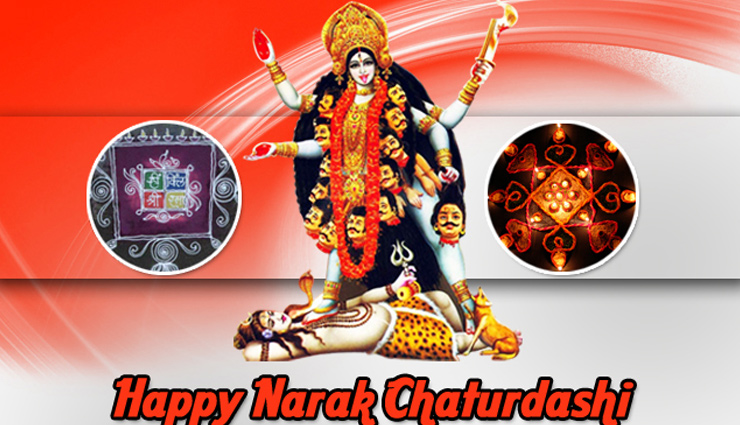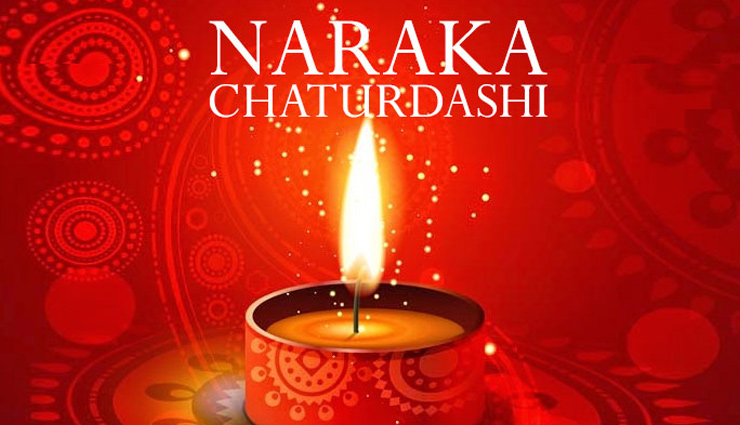Story Of 3rd Day Of Diwali – Naraka Chaturdashi
By: Priyanka Maheshwari Thu, 12 Oct 2017 1:53:18

Naraka Chaturdashi (also known as Kali Chaudas, Roop Chaudas, Choti Diwali or Naraka Nivaran Chaturdashi) is a Hindu festival, which falls on Chaturdashi (14th day) of the Krishna Paksha in the Vikram Samvat Hindu calendar month of Ashwin. It is the third day of the festival of Diwali.
Meaning in Hinduism
The festival is also called as “Kali Chaudas”, where Kali means dark (eternal) and Chaudas means fourteenth, this is celebrated on the 14th day of the dark half of Kartik month. In some regions of India, Kali Chaudas is the day allotted to the worship of Mahakali or Shakti and is believed that on this day Kali killed the asura (demon) Narakasura. Hence also referred to as Naraka-Chaturdashi, Kali Chaudas is day to abolish laziness and evil which create hell in our life and shine light on life.
Rituals Associated
The puja is performed with oil, flowers, and sandalwood. Coconuts are also offered to Hanuman and Prasad of sesame seed, jaggery and rice flakes (poha) with ghee and sugar.
The rituals of Kali Choudas is strongly suggestive of the origin of Diwali as a harvest festival is performed. On this day delicacies are prepared from pounded semi-cooked rice (called Poha or Pova). This rice is taken from the fresh harvest available at that time. This custom is prevalent both in rural and urban areas especially in Western India.

Three Kali Chaudas Stories You Must Know!
1. Story of Lord Hanuman and the Sun
Once Hanumanji as a baby was very hungry. Whilst lying down he saw the sun in the sky and thought it was a fruit and went to pick it. He flew into the sky and put the whole sun in his mouth causing darkness throughout the entire universe. Lord Indra requested that Hanumanji return the sun. When Hanumanji refused, Lord Indra unleashed his vajra and knocked Hanumanji down to earth releasing the Sun.
2. The Legend of King Bali
King Bali became the most powerful king on earth. But he became highly arrogant. His form of charity was an occasion for pomp and show and those who went to seek Alms from the king Bali suffered insults and humiliation. His arrogance and misrule ended when the Lord appeared as beggar (vaman avtaar). King Bali asked the dwarf beggar to get anything in his kingdom. Lord replied he just want a piece of land that could be covered in his three steps. And with his first step Lord Vishnu covered the entire heaven, with the second step the earth and asked Bali where to keep his third step. Bali offered his head and became spiritually enlightened. The Narak chaturdashi day therefore is dedicated to lights and prayers and the elimination of greed.
3. Story of Narkasur Vadh
In the Srimad Bhagavatam, Narakasura or Naraka is the asura son of the earth goddess Bhudevi (Bhumi) and Varaha (third avatar of Vishnu) and is said to have grown to be a demon through association with Banasura. He is said to have established the kingdom of Pragjyotisha after overthrowing the last of the Danava king Ghatakasura.
It was foretold that he would be destroyed by a later incarnation of Vishnu. His mother, the earth, sought the boon from Vishnu that her son should have a long life, and that he should be all powerful. Vishnu granted these boons. The legend of Narakasura is important in the history of Assam, particularly Kamarupa; since Narakasura is cited as the progenitor of many dynasties that ruled Kamarupa in historical times. A hill, to the south of Guwahati is named after him. He is also associated with the Hindu belief of the shakti goddess and place of worship Kamakhya.
Narakasura became evil, in association with another Asura named Banasura. Drunk with power, as he knew himself to be unrivalled in prowess, he brought all the kingdoms on earth under his control. Next, he turned his eyes towards Swargaloka. Even the mighty Indra could not withstand the assault of this son of Earth and had to flee the heavens. Narakasura had become the overlord of both the heavens and earth. Addicted to power, he stole the earrings of Aditi, the heavenly mother goddess, and usurped some of her territory, while also kidnapping 16000 women.

All the Devas, led by Indra went to Vishnu, to ask him to deliver them from Narakasura. Vishnu promised them that he would attend to this matter, when he would be incarnated as Krishna. As promised to Mother Earth, Narakasura was allowed to enjoy a long reign. At last Vishnu was born as Krishna. Aditi, who was a relative of Krishna’s wife Satyabhama (believed to be an Avatar of Bhudevi – Narakasura’ mother), approached Satyabhama for help. When Satyabhama heard of the Narakasura’s ill treatment of women and his behaviour with Aditi, she was enraged. Satyabhama approached Lord Krishna for permission to wage a war against Narakasura. As promised to the Devas and Aditi, Krishna attacked the great fortress of Narakasura, riding his mount Garuda with wife Satyabhama.
Krishna and Satyabhama fighting Narakasura’s armies
Lord Krishna used the Narayanastra and the Agneyastra against the army of Narakasura. The battle was furiously fought. Narakasura possessed 11 Akshauhinis of army that he unleashed on Lord Krishna. However the Lord slew them all with little effort. Lord Krishna also killed Mura, Narakasura’s general. Thus Krishna is called ‘Murāri’ (the killer of Mura). Narakasura used several divine weapons against Lord Krishna, but Krishna easily neutralised all those weapons. Narakasura used the Brahmastra against Lord Krishna, but Lord Krishna neutralised it with his own Brahmastra. Narakasura used the Agneyastra against Lord Krishna, but Lord Krishna neutralised it with the Varunastra. Narakasura used the Nagapasha against Lord Krishna, but Lord Krishna neutralised it with the Garudastra. In desperation, Narakasura launched the Vaishnavastra on Lord Krishna, but Lord Krishna neutralised it with another Vaishnavastra. At last when Narakasura tried to kill Lord Krishna with a trident, Lord Krishna beheaded him with his Sudarshana Chakra (discus). Before dying, the Asura requested a boon that his death anniversary should be celebrated by all the people on earth. Lord Krishna’s victory over Narakasura translated into freedom for all his prisoners and honoring of Aditi. Having rescued the 16,000 women, Lord Krishna married them to restore them to their former dignity.
Before Narakasura’s death, he requested a boon from his mother, Satyabhama, that everyone should celebrate his death with colorful light. Thus this day is celebrated as ‘Naraka Chaturdashi’ – the day before Diwali. Krishna’s and Satyabhama’s victory on Narakasura translated into freedom for all his prisoners and honoring of Aditi. Having rescued the 16,100 women, Krishna married them to restore them to their former dignity.





